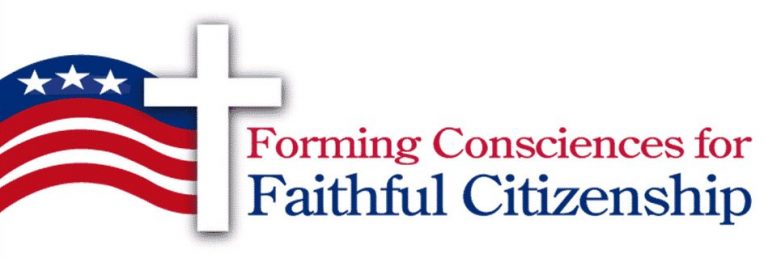
As Catholics, we are called to be active participants in public life. However, we also face a serious challenge when it comes to voting our conscience. Our Catholic Social Teachings challenge us to promote a consistent ethic of life that is not always supported by the culture of our nation. How do we discern our own role in protecting the sanctity of human life, from conception until natural death? How can we fight to defend the dignity of the unborn, the struggling family, the immigrant, and the elderly? How can we speak about our moral values in an increasingly secular world?
The Office for Parish Life will be hosting information sessions and discussions on Voting with a Catholic Conscience, using the USCCB’s 2018 “Forming Consciences for Faithful Citizenship.” Dates for upcoming events are listed below. For more information, please contact Shannon Kowalski at shannon-kowalski@dioceseofscranton.org.
Tuesday, October 23, 6:30-8 PM
Mary Mother of God Parish, Scranton
Wednesday, October 24, 6:30-8 PM
Corpus Christi Parish, Pittston
Thursday, October 25, 6:30-8 PM
St. John Neumann Parish, Lords Valley
Monday, October 29, 6:30-8 PM
Our Lady Queen of Peace, Brodheadsville
Tuesday, October 30, 6:30-8 PM
St. Joseph the Worker Parish, Williamsport
CLICK HERE FOR MORE INFORMATION
Tools for a Personal Examination of Conscience on Faithful Citizenship
Discernment of Responsibility:
- Examining Church teaching and statements by recent popes, do I believe that I have a responsibility to my country, my state, and/or my own family to vote?
- With deeper discernment, am I called to further action in verbally supporting a candidate? Am I called to campaign for a candidate, or perhaps even to run for local office myself?
Discernment of Catholic Moral Life:
- When examining the principles of Catholic Social Teaching, which moral teachings are particularly relevant in this political climate?
Catholic Social Teaching: In Brief
Discernment of Candidates:
- Which candidates seem to support Catholic teaching on the relevant issues of this election? Am I letting my personal bias get in the way here? Can I name, in particular, the policies that each candidate supports or opposes on issues relevant to Catholic teaching?
- Do I think that the candidates will take real, substantive action on these issues?
- Do their past voting records support their claims? Moving beyond my own judgment of their character, does this person put their values into action?
Check Yourself:
- Is my own political or social bias getting in the way of my voting for a particular candidate?
- Am I taking a balanced view to integrate any and all Catholic issues? Am I ignoring any other principles of CST in favor of one or more Catholic voting issues? Why am I choosing to make this decision?
- Am I fact-checking the information I receive from different sources? If I am using editorials or opinion-based sources of information, are these coming from appropriate avenues?
Follow-up:
- How can I make an effort to involve myself in advocacy beyond the election season? How can I continue to make my senators and representatives aware of my values as a Catholic citizen?
